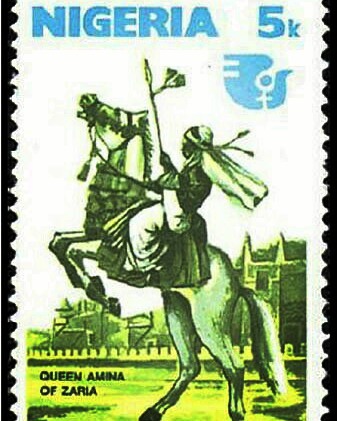
Nigerian Stamp of Amina Sukhera
When most people think of the medieval world, they imagine lavish European courts and iconic films like Monty Python and the Holy Grail, but cultures were flourishing in all areas of the settled world. While the most powerful European nations were sailing and exploring beyond their known world, regions of the African continent were facing their own territorial hardships and social developments. One of the women who best embodies this period is Amina Sukhera.
Amina was born around 1533 in the African kingdom of Zazzau (present-day Nigeria), bearing a name that meant trustworthy and honest, characteristics that would follow her over the course of her life. Legend says her grandmother found her holding a dagger as a child, revealing her strength and ferocity at a young age. Amina refused to allow the limitations of 16th century civilization to keep her from dominating her country’s political and military sector. She became a renowned warrior who personally led military campaigns to expand her country’s territory. Sensitive to her country’s needs, she also helped with commerce and trade, and directly introduced the kola nut as a crop to grow and sell.
Amina refused to marry because she didn’t want her power reduced by the addition of a male leader; she died in 1610 without a legal partner. Though she was not the first woman to refuse marriage in order to retain her power, she is certainly one of the lesser known in the Western world. A statue was erected in her honor in front of the National Arts Theatre in Lagos, Nigeria. Amina’s story illustrates the struggle for many significant women during this period; not only was it difficult for these women to have their lives recorded, but not living in the center of the western world makes her story less likely to be told. Amina is an exception to the many women whose stories fall through the cracks, and she stands for their successes and hardships when they cannot.
